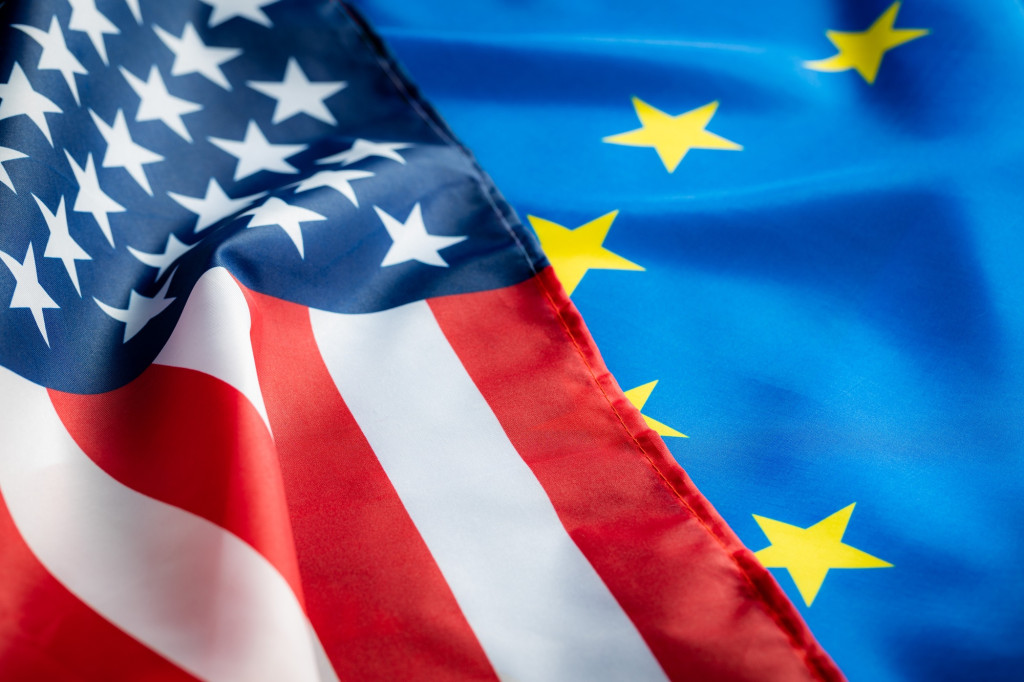EU-US Trade and Technology Council: Key outcomes from the Leuven meeting
The meeting allowed ministers to build on ongoing work and present new deliverables of the TTC after two and a half years of cooperation.

The sixth ministerial meeting of the EU-US Trade and Technology Council (TTC) was convened in Leuven, Belgium, on 4-5 April 2024. The meeting was co-chaired by European Commission Executive Vice-Presidents Margrethe Vestager and Valdis Dombrovskis, alongside US Secretary of State Antony Blinken, Secretary of Commerce Gina Raimondo, and Trade Representative Katherine Tai. Hosted under the Belgian Presidency of the Council of the European Union, the meeting underscored the commitment to strengthening transatlantic ties in the trade and technology sectors.
The Leuven meeting yielded several significant outcomes aimed at enhancing EU-US cooperation:
Outcomes of the meeting
- Enhanced cooperation on critical technologies
- A major outcome of the meeting was the strengthening of cooperation between the EU and US in cutting-edge technologies, notably in the fields of artificial intelligence (AI), semiconductors, and the development of 6G mobile networks. The leaders committed to jointly tackling the challenges and opportunities that these technologies present, aiming to ensure that they are developed securely and ethically.
- Artificial Intelligence (AI): Parties emphasised the importance of advancing AI in a way that upholds democratic values, protects privacy, and ensures fairness. Specific initiatives include the promotion of AI systems that are transparent, accountable, and bias-free. They also agreed to continue working on AI governance frameworks that can be applied across borders.
- Semiconductors: The EU and US acknowledged the critical importance of semiconductors for the functioning of various industries, including automotive, healthcare, and information technology. Given the global semiconductor shortage, the meeting underscored the need for resilient and diversified supply chains, joint investments, and enhanced research in this sector to maintain technological leadership.
- 6G networks: Both parties are committed to collaborating on the early-stage development of 6G technologies, ensuring that they are secure, sustainable, and globally competitive. Their efforts aim to set global standards that will ensure interoperability and equitable access to the benefits of advanced connectivity.
- Strengthening trade security and resilience
- The EU and the US agreed to deepen their partnership further to make transatlantic trade more secure and resilient. This includes tackling cybersecurity threats, managing data privacy concerns, and protecting critical infrastructure from potential digital attacks.
- Export controls and investment screening: The two parties continued to work on harmonising their export control mechanisms, ensuring that sensitive technologies are not used in ways that could threaten global security. They also focused on investment screening mechanisms to prevent malicious foreign investments in key sectors like telecommunications, energy, and technology.
- Green procurement and sustainability: In line with global efforts to combat climate change, the meeting also included discussions about aligning trade policies with environmental sustainability goals. This includes green procurement practices and advancing policies that promote the use of environmentally friendly technologies and products, thereby supporting the EU and US’s shared climate ambitions.
- Trade and digital standards
- Both sides reaffirmed their commitment to promoting fair and open digital markets. The meeting emphasised the importance of developing and aligning digital standards to enable seamless cross-border data flows and digital trade, while maintaining rigorous protections for personal data and privacy.
- E-invoicing and digital supply chains: The EU and US discussed the expansion of e-invoicing as a tool to simplify trade and reduce costs. By facilitating easier and more secure cross-border transactions, e-invoicing is expected to streamline administrative processes, benefiting both businesses and consumers.
- Data governance: The meeting recognised the vital role that data governance plays in the digital economy. Both sides agreed to collaborate on creating data governance frameworks that foster trust and respect for privacy while promoting innovation and efficiency in data usage. This will allow businesses to leverage data for growth while ensuring that it is handled responsibly and ethically.
- Increased engagement with stakeholders
- A critical part of the meeting was the inclusion of stakeholders from industry, academia, and civil society. Their perspectives helped to shape the ongoing and future activities of the TTC, ensuring that initiatives reflect the needs and concerns of a wide range of sectors.
- Inclusive growth: The inclusion of diverse voices in the discussions ensured that the outcomes of the meeting support inclusive growth, with particular attention given to the societal impacts of new technologies. Ensuring that innovations benefit all layers of society, particularly vulnerable groups, remains a priority.
Final thoughts
The Leuven meeting of the EU-US Trade and Technology Council set the stage for a robust and collaborative future in which both sides work hand-in-hand to lead the world in technological innovation and secure, fair trade practices. These meetings are significant steps in aligning the EU and US on critical global issues, from managing new technologies to securing supply chains and advancing sustainability goals.
The agreed-upon outcomes highlight the joint commitment to shaping the future of global trade and technology in a way that balances competitiveness with values such as fairness, democracy, and environmental responsibility. This meeting underscored that the transatlantic partnership is more essential than ever, not only for the EU and US but also for the broader international community, as these technologies and trade practices will set the pace for global norms in the years to come.


